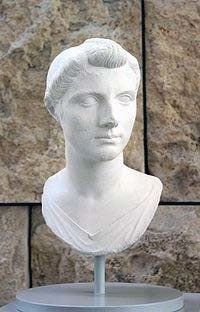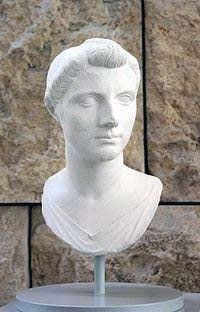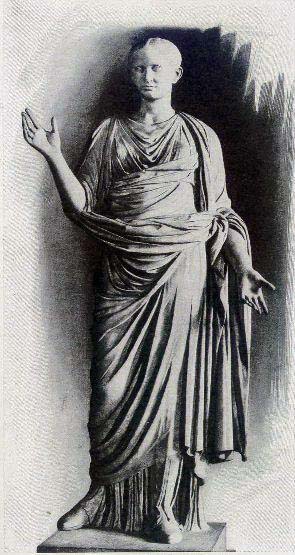One of the most prominent women in Roman history, Octavia was respected and admired by contemporaries for her loyalty, nobility and humanity, and for maintaining traditional Roman feminine virtues.
Full sister to Augustus, Octavia was the only daughter born of Gaius Octavius' second marriage to Atia Balba Caesonia, niece of Julius Caesar.
Octavia appears to have been a loyal and faithful wife to Antony. Between 40 BC–36 BC, Octavia lived with him in his Athenian mansion. She raised her children by Marcellus; Antony's two sons and their two daughters: Antonia Major and Antonia Minor, who were born there. She travelled with him to various provinces.
The alliance was severely tested by Octavia's second husband abandoning her and their children for his former lover Queen Cleopatra VII of Egypt. Mark Antony and Cleopatra had already met in 41 BC, and subsequently had twins. After 36 BC, Octavia returned to Rome with her children by Mark Antony. On several occasions she acted as a political adviser and negotiator between her husband and brother. Mark Antony divorced Octavia in 32 BC, after she had supplied him with men and troops in 35 BC (to be used in his eastern campaigns). With Antony's rejection, divorce, and eventual suicide in 30 BC, Octavia became the sole caretaker of their children. She also became guardian of Antony's remaining children from his unions with both Fulvia and Cleopatra:
Iullus Antonius (Fulvia),
Alexander Helios (Cleopatra),
Cleopatra Selene II (Cleopatra), and
Ptolemy Philadelphus (Cleopatra)
Augustus had adopted her son Marcellus as his heir, but Marcellus died of illness in 23 BC. Octavia had opened the Library of Marcellus in his memory, while her brother completed Marcellus's theatre in his honor.
Aelius Donatus, in his Life of Virgil, states that Virgil
recited three whole books [of his Aeneid] for Augustus: the second, fourth, and sixth--this last out of his well-known affection for Octavia, who (being present at the recitation) is said to have fainted at the lines about her son, "…You shall be Marcellus". Revived only with difficulty, she ordered ten-thousand sesterces to be granted to Virgil for each of the verses."
She never fully recovered from the death of her son and retired from public life, spending her final years dressed in mourning.
Octavia did not marry a third time.
She was still alive when her niece Julia the Elder married Tiberius. Her funeral was a public one, with her sons-in-law carrying her to the grave. She was buried in the Mausoleum of Augustus. Augustus delivered the funeral oration and gave her the highest posthumous honors (e.g. building the Gate of Octavia and Porticus Octaviae in her memory). Augustus declined some other honors decreed to her by the senate, for reasons unknown. She was one of the first Roman women to have coins minted in her image.
One of the most prominent women in Roman history, Octavia was respected and admired by contemporaries for her loyalty, nobility and humanity, and for maintaining traditional Roman feminine virtues.
Full sister to Augustus, Octavia was the only daughter born of Gaius Octavius' second marriage to Atia Balba Caesonia, niece of Julius Caesar.
Octavia appears to have been a loyal and faithful wife to Antony. Between 40 BC–36 BC, Octavia lived with him in his Athenian mansion. She raised her children by Marcellus; Antony's two sons and their two daughters: Antonia Major and Antonia Minor, who were born there. She travelled with him to various provinces.
The alliance was severely tested by Octavia's second husband abandoning her and their children for his former lover Queen Cleopatra VII of Egypt. Mark Antony and Cleopatra had already met in 41 BC, and subsequently had twins. After 36 BC, Octavia returned to Rome with her children by Mark Antony. On several occasions she acted as a political adviser and negotiator between her husband and brother. Mark Antony divorced Octavia in 32 BC, after she had supplied him with men and troops in 35 BC (to be used in his eastern campaigns). With Antony's rejection, divorce, and eventual suicide in 30 BC, Octavia became the sole caretaker of their children. She also became guardian of Antony's remaining children from his unions with both Fulvia and Cleopatra:
Iullus Antonius (Fulvia),
Alexander Helios (Cleopatra),
Cleopatra Selene II (Cleopatra), and
Ptolemy Philadelphus (Cleopatra)
Augustus had adopted her son Marcellus as his heir, but Marcellus died of illness in 23 BC. Octavia had opened the Library of Marcellus in his memory, while her brother completed Marcellus's theatre in his honor.
Aelius Donatus, in his Life of Virgil, states that Virgil
recited three whole books [of his Aeneid] for Augustus: the second, fourth, and sixth--this last out of his well-known affection for Octavia, who (being present at the recitation) is said to have fainted at the lines about her son, "…You shall be Marcellus". Revived only with difficulty, she ordered ten-thousand sesterces to be granted to Virgil for each of the verses."
She never fully recovered from the death of her son and retired from public life, spending her final years dressed in mourning.
Octavia did not marry a third time.
She was still alive when her niece Julia the Elder married Tiberius. Her funeral was a public one, with her sons-in-law carrying her to the grave. She was buried in the Mausoleum of Augustus. Augustus delivered the funeral oration and gave her the highest posthumous honors (e.g. building the Gate of Octavia and Porticus Octaviae in her memory). Augustus declined some other honors decreed to her by the senate, for reasons unknown. She was one of the first Roman women to have coins minted in her image.
Family Members
Advertisement
Explore more
Sponsored by Ancestry
Advertisement








